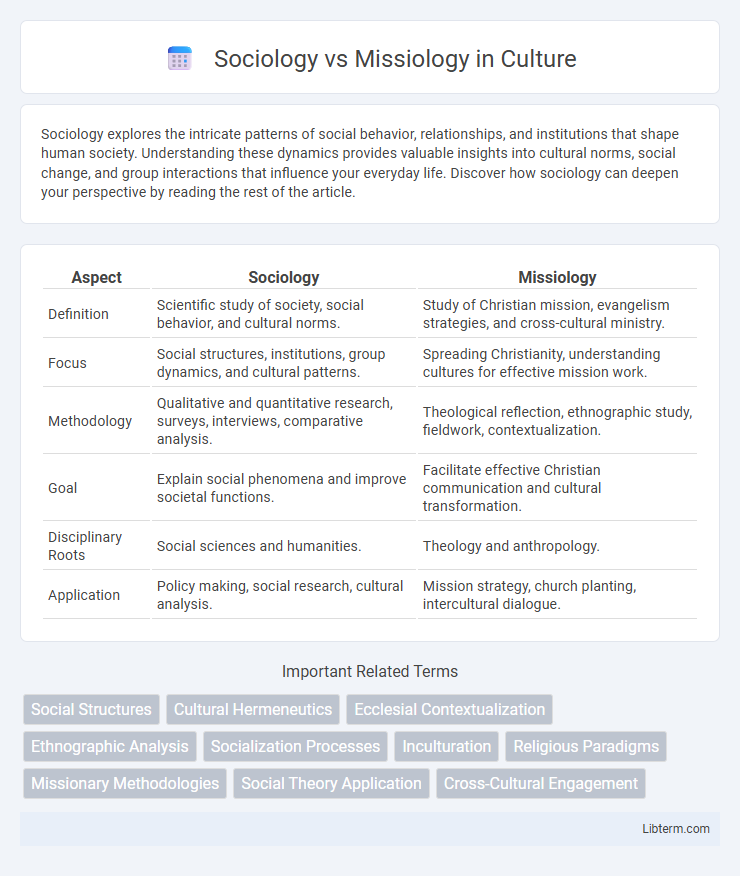Sociology explores the intricate patterns of social behavior, relationships, and institutions that shape human society. Understanding these dynamics provides valuable insights into cultural norms, social change, and group interactions that influence your everyday life. Discover how sociology can deepen your perspective by reading the rest of the article.
Table of Comparison
| Aspect | Sociology | Missiology |
|---|---|---|
| Definition | Scientific study of society, social behavior, and cultural norms. | Study of Christian mission, evangelism strategies, and cross-cultural ministry. |
| Focus | Social structures, institutions, group dynamics, and cultural patterns. | Spreading Christianity, understanding cultures for effective mission work. |
| Methodology | Qualitative and quantitative research, surveys, interviews, comparative analysis. | Theological reflection, ethnographic study, fieldwork, contextualization. |
| Goal | Explain social phenomena and improve societal functions. | Facilitate effective Christian communication and cultural transformation. |
| Disciplinary Roots | Social sciences and humanities. | Theology and anthropology. |
| Application | Policy making, social research, cultural analysis. | Mission strategy, church planting, intercultural dialogue. |
Defining Sociology and Missiology
Sociology is the scientific study of society, social relationships, and patterns of social behavior, focusing on understanding social structures, institutions, and collective human interactions. Missiology is the interdisciplinary study of Christian mission work, exploring the methods, history, theology, and cultural impact of spreading religious beliefs and practices globally. While sociology analyzes broader societal dynamics, missiology specifically investigates the theological and practical aspects of missionary activities within diverse cultural contexts.
Historical Development of Both Disciplines
Sociology emerged in the early 19th century with pioneers like Auguste Comte and Emile Durkheim, focusing on the systematic study of social behavior, institutions, and structures. Missiology developed later, rooted in Christian theological reflection and missionary practice, particularly gaining momentum in the 20th century as an interdisciplinary field integrating anthropology, theology, and cultural studies. Both disciplines evolved through increased academic formalization, with sociology expanding into various social science domains while missiology became essential in understanding global evangelism and cross-cultural religious dynamics.
Core Theories and Approaches
Sociology primarily employs structural functionalism, conflict theory, and symbolic interactionism to analyze social behaviors and institutions, emphasizing societal patterns and power dynamics. Missiology integrates theological frameworks with anthropological and cultural theories, focusing on contextualizing Christian missions and intercultural communication. Both disciplines utilize qualitative and quantitative methods, but missiology uniquely combines doctrinal insights with social scientific approaches to address faith-based community transformations.
Key Research Methods Used
Sociology primarily employs quantitative methods such as surveys and statistical analysis, alongside qualitative approaches like interviews and ethnography to study social behavior and structures. Missiology combines these sociological techniques with theological inquiry, utilizing participant observation, case studies, and contextual analysis to understand religious movements and missionary activities. Both fields emphasize fieldwork, but missiology integrates doctrinal evaluation to interpret cultural impacts on faith communities.
Relationship to Religion and Society
Sociology examines religion as a social phenomenon, analyzing its role in shaping social structures, group behavior, and cultural norms within society. Missiology focuses specifically on the religious mission, studying how Christian faith is communicated, spread, and practiced within various cultural and societal contexts. The relationship between religion and society in sociology highlights social functions and impacts, whereas missiology centers on religious propagation and spiritual transformation.
Differences in Underlying Assumptions
Sociology studies human behavior, social structures, and cultural patterns based on empirical research and secular theories, emphasizing objective analysis of societies. Missiology operates within a theological framework, focusing on the principles and practice of Christian mission work, assuming divine guidance and spiritual transformation as core outcomes. These differing assumptions shape sociology's descriptive approach versus missiology's normative and faith-based goals.
Applications in Global Contexts
Sociology analyzes social structures, behaviors, and cultural dynamics to address global issues such as migration, inequality, and social development. Missiology applies theological and cultural insights to guide religious missions, focusing on intercultural communication and community transformation in diverse international settings. Both disciplines contribute to global understanding by informing policy, fostering cross-cultural engagement, and supporting sustainable social change.
Interdisciplinary Connections
Sociology and Missiology intersect through the study of human behavior, social structures, and cultural dynamics, providing a comprehensive understanding of community development and religious influence. Sociology's analysis of social patterns and institutions enhances Missiology's strategies for effective mission work by addressing cultural sensitivities and social needs. Interdisciplinary approaches integrate sociological theories with theological frameworks, fostering impactful engagement in diverse cultural settings.
Critiques and Challenges Faced
Sociology faces critiques regarding its perceived theoretical abstraction and occasional cultural biases that limit practical application in diverse social contexts. Missiology encounters challenges in bridging theological frameworks with dynamic cultural realities, often criticized for ethnocentrism and difficulties adapting to pluralistic societies. Both disciplines strive to address complexities in human behavior and belief systems, yet must continuously evolve to overcome methodological limitations and enhance interdisciplinary relevance.
Future Trends and Collaborative Opportunities
Sociology and missiology increasingly intersect in examining global social dynamics and religious movements, fostering collaborative research on cultural integration and community development. Future trends highlight the integration of digital technologies and data analytics to assess societal changes and mission strategies more effectively. Joint efforts between sociologists and missiologists present opportunities to address complex social issues such as migration, secularization, and interfaith dialogue through multidisciplinary approaches.
Sociology Infographic

 libterm.com
libterm.com